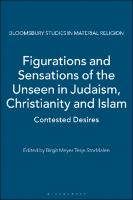Figurations and Sensations of the Unseen in Judaism, Christianity and Islam
Contested Desires
Contributor(s)
Meyer, Birgit (editor)
Stordalen, Terje (editor)
Language
EnglishAbstract
This book is open access and available on www.bloomsburycollections.com. It is funded by the University of Oslo and Utrecht University. Judaism, Christianity and Islam are known to privilege words over images. This book shows, however, that the reality is more complex. Figurationsand Sensations of the Unseen explores the complex procedures used to render the invisible as visible and the elusive as tangible in these three traditions. Working from different disciplinary angles, contributors reflect on figuration and sensation in biblical culture, medieval Jewish culture, the imagination of the unseen in Islamic settings, Christian assaults on 'idolatry' in Africa, baroque and modern Church art, contemporary Eastern Orthodox tradition, photography on the East African coast, European opera and literature, and more. The book shows that the three religious traditions have formed sensorial regimes: embodied habits, traditions and standards for seeing, sensing, displaying, and figuring that which could not, or should not, be seen. So, the desire for seeing the invisible and experiencing the beyond are paradoxically confirmed, contested and controlled, by the sensorial regimes in vogue. This carries over even into secularized use of religious figurations in arts and literature. Figurations and Sensations of the Unseen is important reading for scholars of anthropology, religious studies, Jewish studies, Christian studies, Islamic studies, art history, cultural studies, biblical studies and archaeology.
Keywords
Christianity; Comparative religion; Islam; JudaismDOI
10.5040/9781350078666ISBN
9781350078659, 9781350078642, 9781350078659Publisher
Bloomsbury AcademicPublisher website
https://www.bloomsbury.com/academic/Publication date and place
London, 2019Imprint
Bloomsbury AcademicSeries
Bloomsbury Studies in Material Religion,Classification
Christianity
Comparative religion
Islam
Judaism
Material culture


 Download
Download